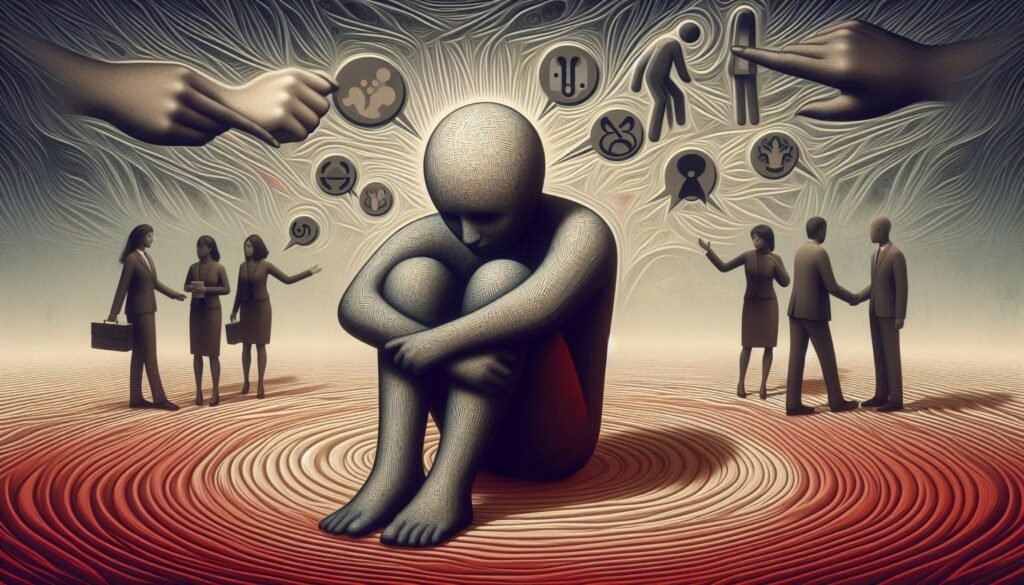Navigating social interactions can feel like walking through a minefield, especially for those who are highly sensitive to subtleties in communication. Neuroticism and microaggression perception play a significant role in this complex landscape. Microaggressions—those seemingly minor comments or actions that convey hostility or discrimination—can have profound effects on individuals. For people with high levels of neuroticism, the impact can be even more pronounced.
Understanding how personality traits influence our perceptions of these subtle slights is crucial. This blog post delves into the intricate relationship between neuroticism and microaggression perception, exploring everything from emotional reactions to coping strategies for managing these experiences. Whether you’re navigating your own feelings or seeking to support someone else, there’s valuable insight ahead. Let’s unravel the layers behind these nuanced concepts together!

Defining Microaggressions: Forms and Impact in Daily Interactions
Microaggressions are subtle, often unintentional comments or actions that convey derogatory messages. They can manifest in various forms, including verbal remarks, non-verbal gestures, and environmental cues. While these interactions may seem trivial on the surface, their cumulative effect can be deeply damaging.
Common examples include phrases like “You speak English very well” directed at a person of color or assumptions based on stereotypes. Such statements may appear benign but carry underlying prejudice that reinforces societal biases.
The impact of microaggressions is profound. Individuals who experience them frequently report feelings of alienation and diminished self-worth. These encounters contribute to a hostile environment that affects mental health over time.
Moreover, microaggressions affect relationships and workplace dynamics by creating tension and mistrust among colleagues or peers. Understanding their nuances is essential for fostering more inclusive social settings where all individuals feel respected and valued.
Neuroticism: A Personality Trait Influencing Social Perception
Neuroticism is one of the five major personality traits identified in psychology. It signifies a person’s tendency toward emotional instability, anxiety, and moodiness. Individuals high in neuroticism often experience heightened sensitivity to stressors and perceived threats. This can significantly influence how they interpret social cues.
People with higher levels of neuroticism may perceive neutral or ambiguous interactions as negative or threatening. This lens affects their understanding of others’ intentions, making them more likely to misinterpret benign comments as microaggressions. Consequently, their reactions are often driven by feelings rather than objective assessments.
Moreover, neurotic individuals might dwell on past experiences that reinforce these interpretations. Their memories shape expectations for future interactions, creating a cycle of heightened vigilance against potential slights. As a result, even subtle social dynamics can feel overwhelming.
This trait plays an essential role in shaping interpersonal relationships and communication styles. Understanding its impact can help people navigate social settings more effectively while fostering empathy for those affected by it.
Heightened Sensitivity: How Neuroticism Affects Microaggression Detection
Individuals high in neuroticism often exhibit heightened sensitivity to social cues. This increased vigilance can make them more attuned to microaggressions that others might overlook. For these individuals, a seemingly innocuous comment can trigger feelings of anxiety or defensiveness.
Neurotic people may interpret ambiguous situations through a lens of negativity. Their past experiences and emotional states color their perceptions, leading them to see slights where none were intended. This skewed perspective can create challenges in navigating everyday interactions.
Additionally, their tendency to ruminate on perceived offenses amplifies the impact of microaggressions. Each minor incident accumulates over time, fostering resentment and mistrust toward peers or institutions.
This cycle of detection and emotional response can lead to significant distress for those who are highly neurotic. Understanding this dynamic is essential for creating supportive environments that acknowledge these sensitivities while promoting healthier communication patterns.
Emotional Responses: Neurotic Reactions to Perceived Slights
Neurotic individuals often experience intense emotional reactions to perceived slights. Their heightened sensitivity can amplify feelings of anxiety, anger, or sadness in response to microaggressions. These emotions may arise from a fear of rejection or inadequacy, making even subtle comments feel like personal attacks.
When faced with ambiguous situations, neurotic people might misinterpret intentions behind remarks or behaviors. This tendency can lead to rumination—constantly revisiting the incident and analyzing it from multiple angles—which further intensifies their emotional turmoil. They become trapped in a cycle of negative thoughts and feelings.
These emotional responses are not only challenging for those experiencing them but also impact their relationships. Friends and family may struggle to understand the disproportionate reaction that occurs when a seemingly harmless comment is involved.
Recognizing these patterns is crucial for both neurotic individuals and those around them. Awareness allows for better communication about feelings and fosters empathy within social interactions.
Cognitive Appraisal: Interpreting Ambiguous Situations in Neurotic Individuals
Cognitive appraisal plays a crucial role in how neurotic individuals perceive their surroundings. Individuals with high levels of neuroticism often interpret ambiguous situations through a lens of anxiety and fear. This heightened sensitivity can skew their understanding, leading to misinterpretations of neutral or benign comments as potentially harmful.
For example, a casual remark from a colleague may be viewed as criticism rather than constructive feedback. Such interpretations are not just about what is said but also involve the emotional context surrounding those interactions. Neurotic individuals may dwell on these perceived slights, amplifying feelings of distress and insecurity.
Moreover, this cognitive distortion can create a cycle where past experiences shape current perceptions. If someone has faced microaggressions before, they might become hyper-vigilant. Their mind becomes trained to anticipate negative intent even when it isn’t present.
This pattern complicates social interactions for neurotic people, making them more prone to conflict and misunderstanding within their environments. It highlights the significant interplay between personality traits and social perception dynamics.
The Role of Past Experiences in Shaping Neurotic Microaggression Perception
Past experiences significantly shape how individuals perceive microaggressions, particularly among those high in neuroticism. Individuals with a history of discrimination or subtle slights may develop heightened sensitivity to perceived injustices. This can lead to an almost hyper-vigilant awareness of their social surroundings.
For someone who has faced repeated negative encounters, the lens through which they view interactions is often skewed. Their past influences not just what they notice but also how they interpret ambiguous situations. A seemingly innocuous comment might trigger memories of past insults, prompting an exaggerated emotional response.
Moreover, early life experiences play a crucial role in this dynamic. Childhood environments that lacked support or validation can contribute to increased neurotic traits later in life. As adults, these individuals may misinterpret friendly gestures as microaggressions due to their upbringing.
The cumulative effect of such experiences creates a feedback loop where previous traumas reinforce sensitivity and negativity toward social interactions. Understanding this connection helps illuminate why some people react more strongly than others when confronted with subtle forms of discrimination.
Intersectionality: Neuroticism and Other Identity Factors in Microaggression Studies
Intersectionality plays a crucial role in understanding how neuroticism and microaggression perception interact. Different identity factors, such as race, gender, sexual orientation, and socioeconomic status can amplify or mitigate the experience of microaggressions. For instance, individuals belonging to multiple marginalized groups may perceive these subtle slights more acutely due to their unique social positioning.
Neurotic individuals often have heightened sensitivity to stressors in their environment. When combined with other identity factors, this trait can lead to an increased likelihood of interpreting ambiguous comments as negative or discriminatory. Their emotional responses may be influenced not just by personality traits but also by societal narratives surrounding their identities.
Furthermore, intersectional experiences shape one’s coping mechanisms and resilience against perceived discrimination. A person with high neuroticism from a minority background might react differently than someone from a majority group facing similar levels of anxiety.
Understanding these dynamics is essential for researchers and practitioners aiming to address the complexities within microaggression studies effectively. By acknowledging intersectionality alongside neuroticism, we can better grasp the full impact of subtle discrimination on diverse populations.
Coping Strategies: Managing Microaggressions in Highly Neurotic People
Coping with microaggressions can be particularly challenging for highly neurotic individuals. Their heightened sensitivity often amplifies the emotional weight of these subtle slights. Therefore, developing effective coping strategies is essential.
One helpful approach is mindfulness training. This technique encourages awareness of thoughts and feelings without judgment. By practicing mindfulness, individuals can create distance between themselves and their reactions to perceived offenses.
Another strategy involves cognitive restructuring. This process helps individuals reframe negative thoughts associated with microaggressions into more constructive perspectives. By changing how they interpret situations, those high in neuroticism can reduce the intensity of their emotional responses.
Seeking social support plays a crucial role in coping effectively. Surrounding oneself with understanding friends or family members provides an emotional buffer against distress caused by microaggressions. Engaging in open conversations about experiences fosters validation and connection that can alleviate feelings of isolation.
Social Support and Its Importance for Neurotic Individuals Facing Microaggressions
Social support plays a crucial role for neurotic individuals dealing with microaggressions. These subtle forms of discrimination can evoke strong emotional responses, often leaving victims feeling isolated and misunderstood. Having a supportive network helps mitigate these feelings and enhances emotional resilience.
Friends, family, or even colleagues who understand the nuances of microaggressions provide a safe space to express feelings without judgment. This validation is essential as it allows neurotic individuals to process their experiences more constructively. Sharing stories within a supportive circle can also foster camaraderie among those facing similar challenges.
Moreover, social support systems serve as buffers against stress. When people feel backed by others, they are better equipped to navigate difficult situations. This sense of belonging reduces anxiety and promotes healthier coping mechanisms.
Connecting with others allows neurotic individuals to gain different perspectives on their experiences. This exchange not only broadens understanding but also empowers them in addressing perceived slights effectively in various contexts.
Educating and Intervening: Reducing Microaggressions in Diverse Settings
Addressing neuroticism and microaggression perception requires a proactive approach. Education plays an essential role in fostering understanding among diverse groups. Workshops can help individuals recognize their biases, encouraging empathy towards those who may experience subtle discrimination.
Creating safe spaces for dialogue is vital. Open conversations allow people to share experiences without fear of judgment. This encourages awareness and promotes sensitivity to the impact of words and actions on others’ mental health.
Interventions should also focus on training leaders within organizations. Managers equipped with knowledge about microaggressions can mitigate harmful interactions before they escalate. They must model inclusive behaviors, setting a standard that everyone can follow.
Support systems are crucial as well; establishing peer support programs offers individuals a place to turn when faced with microaggressions or emotional distress related to their neurotic tendencies.
Ongoing evaluation of workplace culture and social environments will ensure that these initiatives remain effective over time. By committing to education and intervention strategies, we can create more inclusive settings where all individuals feel valued and understood—regardless of their personality traits or backgrounds.


